Where to Order Groceries in SF
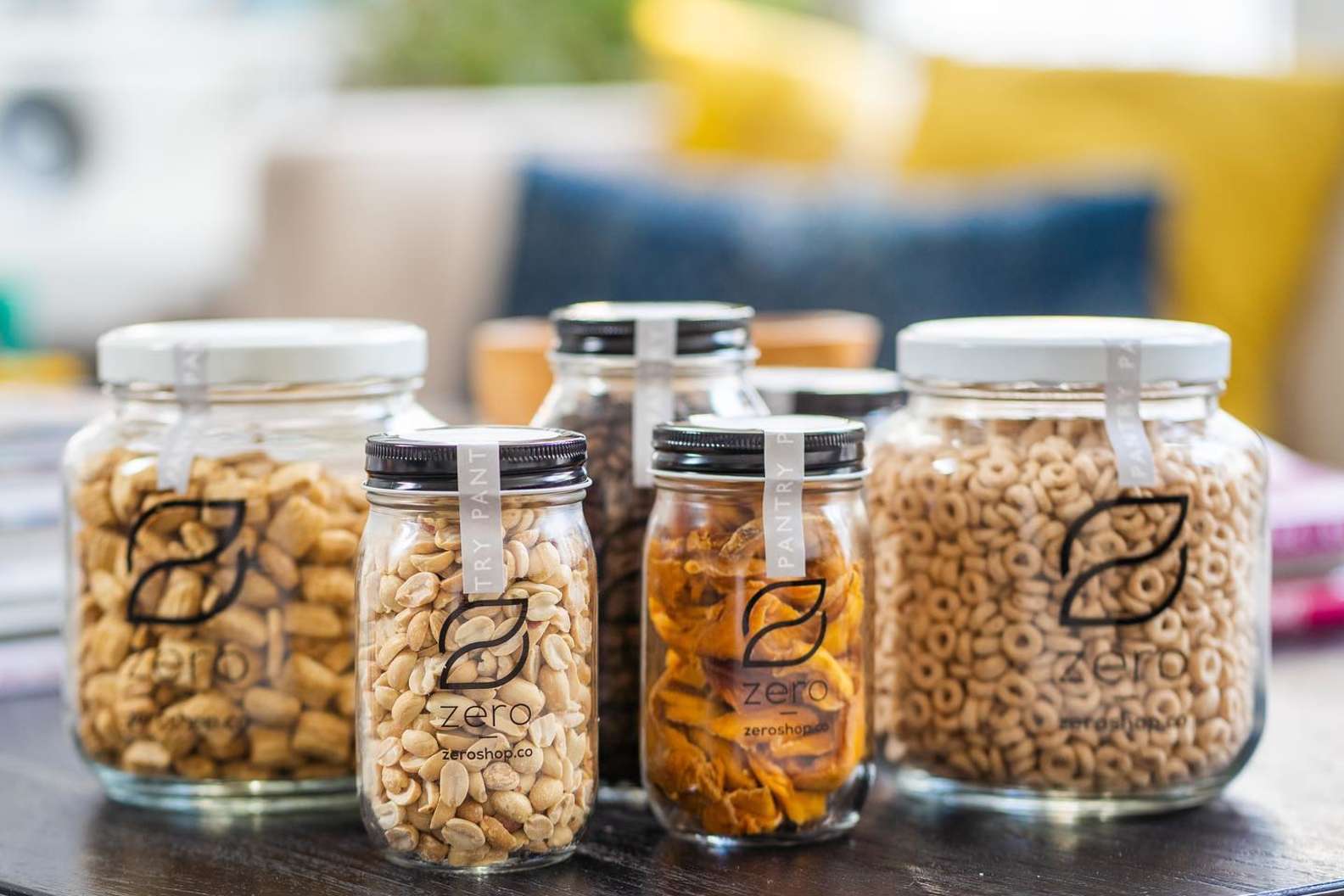
All with pickup and delivery.
Grocery shopping in San Francisco required a fair bit of planning pre-pandemic, but these days, it feels like pulling off a heist. Should you stick with the overpriced eggs from the corner store, or brave the crowds at Safeway to make that stimulus check stretch? Is your last Lysol wipe best used on the shopping cart handle, or for wiping down all those canned beans you’ve toted home? Is there even such a thing as a “quieter” time at Trader Joe’s anymore?
If you’re seeking relief from these and other questions, consider turning to one of SF’s grocery delivery services, which make it easy to maintain a fully stocked fridge without breaking quarantine. Some are the tried-and-true big guns; others are restaurant- and farm-run upstarts aiming to help small businesses ride out the crisis. Almost all offer doorstep drop-offs, allowing you to minimize your face-to-face contact.
With demand through the roof, be aware you’ll likely need to place your order up to a week in advance for all these services, and item availability will be spottier than usual. And if ever there was a time to tip lavishly, it’s now — delivery folks are putting their lives on the line, and they’re probably running just as low on toilet paper as you are.
Instacart
Since it’s based here in SF, the 10,000-pound-gorilla of grocery delivery has most of the major local chains in its grasp. Whether you need bulk laundry detergent from Costco, organic oat milk yogurt from Rainbow Grocery, or a pint of Bi-Rite’s salted caramel ice cream, your go-to store is probably on the platform. But with delivery fees, service fees, and extra fees during peak hours, the costs can add up. If you’re planning to buy regularly, consider joining Instacart Express ($10/month or $99/year), which offers free delivery on orders over $35 and no peak fees.
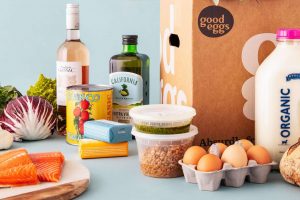
Good Eggs
Another SF-based startup, Good Eggs is focused on organic food, with fruits and vegetables sourced directly from local farms. The site carries pretty much anything you’d want from a grocery store, usually in its most organic/artisanal form, along with some quirkier fare (think handcrafted cocktail bitters and salmon jerky). If you’re sick of playing chef, the Blue Apron-style meal kits are a godsend: most can be whipped up in about 20 minutes, and they’re cheaper than takeout at $7-10 per serving. The order minimum is $30, with an $8 delivery charge on orders under $80. Deliveries at peak hours run an extra $4.
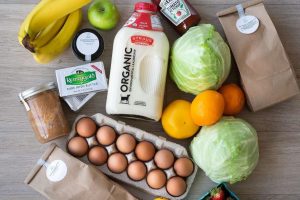
Zero
This grocery startup is also focused on organic items, but with an extra-sustainable twist: no plastic containers of any kind allowed. That means the selection is fairly limited (only one kind of bread, for example, and no ice cream), but if you’re all stocked up on pantry staples and just need to reload your cache of milk, eggs and veggies, Zero could be a good fit. Delivery is free with a $25/month membership fee, which also knocks down individual item prices by 10 to 15 percent. Otherwise, expect to pay $8 for delivery, with no order minimum.
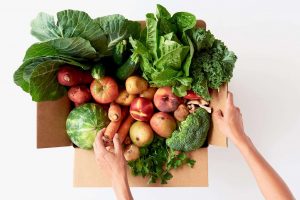
Imperfect Foods
Quarantine is turning all of us into our realest selves — including the ones that haven’t worn makeup for days or non-stretchy pants for weeks. In the spirit of embracing these cosmetic imperfections, consider placing an order with Imperfect Produce, which saves ugly but perfectly edible fruits and vegetables from the landfill. Choose from a box of conventional ($16) or organic ($24) produce, then add on “packs” of dairy staples, snacks, or meat/fish for $7-10 apiece. Once your weekly “window” opens, you can dive in to fine-tune the items you want in each category, adding extras if needed. There’s a $30 minimum and a $5-6 delivery fee. And if you recently lost a job, take note that anyone on food stamps gets a 33% discount.
Luke’s Local
If you’d prefer to skip the startups and go direct, this Cole Valley-based market offers a full selection of largely organic groceries deliverable via app. Produce, meat, dairy, and bread are all on offer, as well as frozen food. There’s also a selection of pre-prepared “chef’s meals,” from a kale Caesar salad to a quart of beef bolognese for pouring on pasta. Expect a $20 order minimum, plus a $6 delivery fee. One upside: delivery is almost always same-day, which is a nice bonus if you need a key item semi-urgently.
CSAs
If you’re willing to sacrifice freedom of choice, signing up for a CSA box of seasonal produce can be a great way to support a local farm that’s lost access to its regular restaurant clients. The catch: since they’re located far outside the city, most farms are doing curbside pickup instead of door-to-door delivery. CUESA, which runs the Ferry Plaza Farmers Market, has launched its own box that goes online Tuesday for Saturday pickup; it’s also hosting Ferry Building pickups for boxes from growers like Dirty Girl Produce, Oya Organics, and Star Route Farms. Or head to a local restaurant to grab your box from Tomatero Farm or Martin Bournhonesque. If delivery is a non-negotiable, Green Thumb Organics Farms will mail a box to your door.
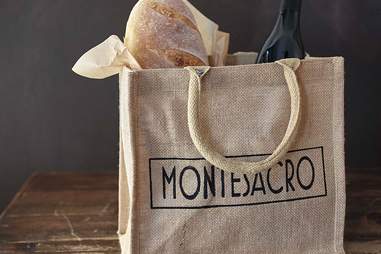
Restaurants-turned-grocery stores
While a lot of restaurants have focused on beefing up their takeout options, a few have taken advantage of their wholesale suppliers to pivot to groceries. FiDi wine bar The Barrel Room has a remarkably broad selection of grocery items, and though they come at a cost ($50 minimum, $10 delivery fee), it’s nice to be able to throw in a few extras a typical store can’t touch, like pre-mixed cocktails and fresh fettuccine made in-house.
Other restaurants are doing grocery service within their niche: SoMa pizzeria Montesacro has shifted into full Italian alimentari mode, with an impressive selection of salumi and cheese (plus staples like canned tomatoes and flour). Or if you want a restaurant-quality meal kit, Noe Valley’s Douglas is offering a rotation of ready-to-assemble dinners from top local restaurants like Kin Khao, Mister Jiu’s, and Pizzeria Delfina, which can be padded out with essentials like vegetables, milk, and wine for same-day neighborhood delivery ($20 minimum, $5 fee).